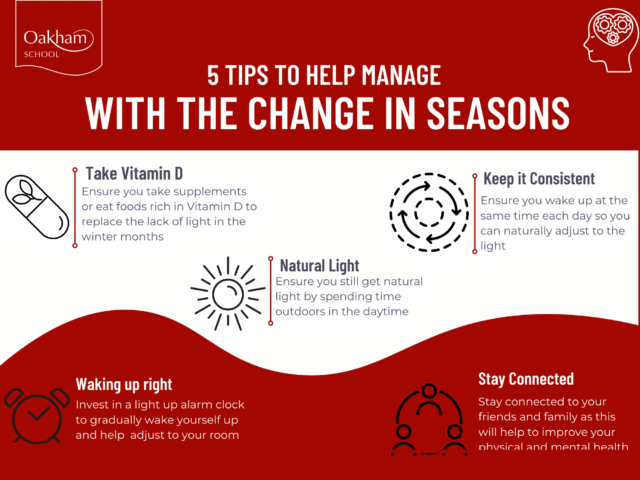Now that the clocks have gone back and the colder weather is upon us, many people have been affected by the changes to our daily lives.

Whilst we may all struggle to adjust, especially to the darker mornings and evenings, we spoke to our Head of Psychology Miss Charlotte Findlay, to get her views on how we can embrace the new season and look after our mental well-being.
The changing clocks often creates a desynchronization with our natural body clocks which can make it harder to maintain energy levels and to get out of bed in the mornings. These rhythms work on a rough 24-hour basis which is unique to everyone (some are slightly less than 24 hours, some slightly over) and require light to essentially ‘reset’ the 24-hour-clock.
In the summer when it’s daylight at 5am, we may find we are waking up earlier and generally feel alert and perky on a bright sunny day, but in the winter when it’s darker we struggle to receive enough light in the mornings to decrease melatonin which is essential in the ‘waking up’ part of our sleep-wake cycle.
In younger children, this can be particularly disruptive to a schedule they may be familiar with and it could be more challenging to get them out of bed and ready for lessons on time.
Our circadian rhythms – our physical, mental, and behavioural changes that follow a 24-hour cycle – are very consistent in that we may find that during a break we are still waking up naturally at 6 or 7am, and one late evening can throw us off for the next day.
So, we may see that pupils – and even staff – are a bit sluggish this term, especially during their first lesson, until they begin to wake up in mid-morning naturally and adjust.
Additionally, because of the hour shift in time, the body can’t always catch up that fast, so we may see that we are struggling to wake up and finding it difficult to get to sleep in the evenings. Overall, disruption to our sleep can impact our concentration, memory, mood, and appetite so going slow for the first few days is a smart idea.
Charlotte’s top tips for adjusting to the new season are:
1. Waking up right
Investing in a light up alarm clock can be life-changing for helping wake you up in the mornings. If you’re struggling to get out of bed when it’s dark, having an alarm clock that gradually lightens your room as you wake can be a great way to adapt and ensure you’re ready to start the day.
2. Consistency is key
Ensure you’re waking up for school at the same time every morning to keep your routine consistent and allow you to get used to the change in light over the first few hours of you waking.
3. Stay connected
Ensure you stay well connected with your friends, family and teachers and talk to them about how you’re feeling. Keeping people you love close to you can help you to feel less stressed, increases laughter and general happiness, and has many additional mental and physical health benefits.
4. Ensure you get natural light
Whilst there is less of it, getting natural light during the day should still be a priority for pupils. With our beautiful 70-acre campus, even walking to and from lessons and spending breaktime outside when the weather is nice can really help you in the long run.
5. Get the right vitamins
Due to a lack of light in the winter months affecting our circadian rhythm, it’s more important than ever to ensure you are getting enough Vitamin D, which our bodies typically create from sunlight exposure. Therefore, adding Vitamin D to your diet with foods or supplements is a great way to promote healthy bones, muscles, and teeth whilst playing a key part in keeping your immune system strong.
It’s important to remember that whilst this period of time may be challenging to adapt to at first, autumn and winter provide us with many exciting opportunities and things to look forward to. Here at Oakham School, we’re especially looking forward to starting our festive celebrations in December and hope that we get to see our wonderful campus in the snow at some point.
Psychology is a brand new subject for 2021 at Oakham School and is offered to pupils as part of the IB Diploma and A-levels.





